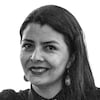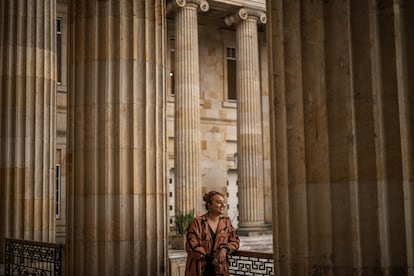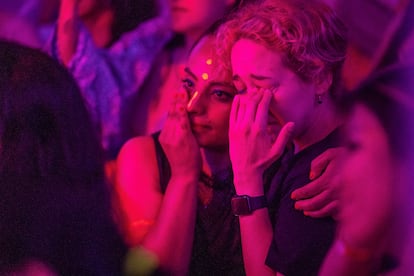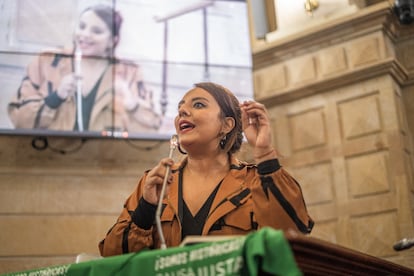Juliana Hernández: ‘Armed conflict has dominated the feminist agenda in Colombia for 60 years’
The executive director of the Artemisas Foundation talks about equality, women’s representation in elected office and the political and economic violence suffered by women leaders in her country

As a child, Juliana Hernández De La Torre dreamed of working for a humanitarian organization in Africa. She believed that it was there, thousands of miles away from her native Colombia, where the needs were most acute. She did not know what was happening here, in the capital city, on the Colombian Pacific coast, or in the war-torn Caribbean coast. At that time, the struggle of thousands of women who confronted armed groups, raised their children amid violence and overcame their fears to help their communities was a world away. They were women of steel who were the leaders of political processes without ever being in power.
Hernández graduated with a degree in finance and international relations. Her career has taken thousands of personal and professional turns: She worked in the financial sector, was involved in social processes, distanced herself from conflict to preserve her mental health and, no, she never went to Africa. She traded that dream for a bigger one: to create training networks in her country so that women leaders could win political power. Her premise, and that of Artemisas (the organization she created in the midst of the pandemic), is that to change the country you have to change its politics.

The problem is that in Colombia, as in other Latin American countries, politics is still dominated by men. Not only in Congress, where only 28% of the seats are held by women, but also in other elected positions in the regions. Not to mention the presidency. The closest a woman has come to that position is with Vice President Francia Márquez. But her arrival in that post has led to racist attacks, political violence and greater demands on her than are usually put on men.
Hernández is committed to providing tools and training to women who want to enter politics to avoid having men open doors for them, as has traditionally been the case. “That is an inheritance of a patriarchal culture that we must break away from,” she says and reflects how in her life that was the norm. Her father, her bosses in the financial sector where she became a marketing manager at a very young age, then her colleagues in other social organizations all did it. That took its toll. In a deep conversation in a Bogotá café, Hernández admits that this made her an overbearing and aggressive leader, a woman who assumed patriarchal attitudes to demonstrate her abilities. She says she has learned from this.
Now her life goal, she says, is to “enable all women who want to access power,” to give them the tools and a network to help them when they are attacked. “A space where they feel they can fall as many times as necessary, because we will be there,” says this woman with a strong voice and a stronger personality. Hernández leads a platform that seeks to strengthen the political participation of 300 women from different territories and political parties in Colombia.

At least 100 of these women leaders met last weekend in the town of Melgar, two hours from Bogotá, at a kind of feminist convention with the Nosotras Ahora network (an activist, feminist group). As Vice President Márquez, who participated virtually said, it was a meeting for women in politics to think about themselves. Congresswomen, councilwomen from different municipalities and candidates for elected office in different parts of the country came to talk about political violence, take workshops on electoral strategy, disinformation management, knitting, singing and even twerking. “Politics is also about having a good time,” says Hernández.
However, it is not at all common in Colombia. Women often avoid participating in politics because it is an uphill struggle that puts their lives and those of their families at risk. As women’s political participation advances, violence against them increases. “The main challenges for women in Colombia are their personal lives and their mental health. Here leadership also involves receiving threats in which their work as social, environmental and community leaders is at risk. It is a high-risk exercise,” says Hernández, and she also refers to economic violence. “Another challenge is how we get the leadership to earn an income. It may sound very utilitarian, but the way we have to sustain ourselves in a world like this is by earning, by having wages, by recognizing the care work that these women do,” she says.
Building collective power
One of Hernández’s first encounters with a reality that was alien to her was in Buenaventura, one of the most violent cities in Colombia. She worked in humanitarian spaces in the city and met courageous women leaders who overcame disputes to confront armed groups together. “Listening to them was to send (feminist) theory to hell. They were having in-depth discussions on the whole theory of oppression, of new masculinities, of what it means to weave, to have a safe space for women,” says Hernández, who has a tendency to be controversial and does not do things in half-measures. Hernández says that, as a child, she was introverted, something that is hard to believe because she conveys a lot of closeness and self-sufficiency. She knows and also admits that her character can be abrasive, but she says she is strict and very disciplined, that she likes to shine.

Before getting involved in the struggle against the violence on Colombia’s Pacific coast, she had listened to and assessed statements from victims of the conflict when the Victims Law was created in 2011. It was only one semester, but it gave her the opportunity to hear first-hand the effects they were suffering. She also did so at Plaza La Hoja, a Bogotá housing project for perpetrators and victims of the conflict. Both jobs caused her severe mental stress, which, however, did not keep her away from activism. “I think it’s important to talk about mental health and be honest. Every woman’s personal life has to do with the political struggle. You can never disassociate feminism from your personal life.”
Peace, an epiphany
The peace process between the former government of Juan Manuel Santos and the now extinct FARC was like an epiphany for Hernández, who sees it as a moment of cultural transformation, a paradigm shift for her generation. “The armed conflict has dominated the agenda of feminists in Colombia. We have been talking about the war for 60 years and perhaps that is why Spanish and Argentine women are so advanced in feminist discussions.”
Hernández then worked for a ‘yes’ vote in the peace referendum, the option that did not win; she was in the peace camp that was set up in Bolivar square to insist on the signing of the agreement; and then she became obsessed with overseeing the laws that were to support it. “I am very institutionalist and, as a feminist, that has attracted a lot of criticism, because they [institutions] are patriarchal structures. I think you can go out and mobilize with batucadas (drum parades accompanying protests) as many times as you want, but the law that protects us from being murdered is a law that has to be sanctioned,” she says.
That is why she is often seen at Congress, at which she has developed political advocacy processes in different areas. Recently, she spoke out on surrogacy and was at the forefront of a bill on political violence against women. The first step, however, is to continue to increase women’s representation. According to the report Women and Men: Gender Gaps in Colombia, by UN Women, the Presidential Council for Women and the National Administrative Department of Statistics (DANE), “although there are women who have managed to overcome great obstacles and have become prominent political figures and leaders, there is still a long way to go to make these successes attainable and to attain them for other women who want and have the right to participate in all spaces and at all levels of decision-making.”
Juliana Hernández is convinced that the “time for women” has come and that the new figures that will change the country will come from this support network. She knows it’s not easy. “Our aspirations for elected office and desire for power has not been accepted so easily by our husbands, partners, sons and daughters, because this has been an exercise for men. Every time we women speak up or say we want to have power, that message is not well received,” she says. Then comes silencing and mansplaining. “We are required to prove every day of our lives that we are good mothers, daughters, that we deserve the salaries we have, that we deserve a decent life,” she maintains.
The solution, she believes, is to build collective power. “I believe in the power of women articulating what they want and in creating a very large collective power at the regional and national level. It is from there that transformations are achieved,” she insists. “I didn’t go to Africa, but I consider that my life has been full and it’s because I work with women who are learning to build something together.”
Sign up for our weekly newsletter to get more English-language news coverage from EL PAÍS USA Edition